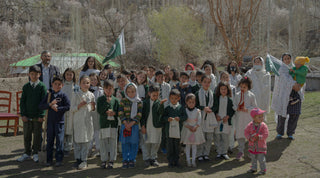The early physical landscape of Chitral, North Pakistan region in the Hindukush and the Himalayas (HKH) mountains enjoyed indigenous forest cover consisting of Russian Olive trees, sea buckthorn bushes, hawthorn berry trees, redberry bushes, and rosehip bushes beside other numerous medicinal herbs and plants. The local forest not only ensured continuity of local eco system maintaining harmony of human and nature for centuries, but also the berries and leaves of these indigenous plants were used for healing and wellness purpose by local people.
Indigenous forests cover approximately 15% of the earth's land surface and are home to many species of plants and animals. However, these forests are under threat due to deforestation, which is driven by various factors such as forest cutting for fuel purpose and agriculture. Studies have shown that deforestation is responsible for approximately 15% of global greenhouse gas emissions (Gibbs et al., 2015).
Pakistan is rich in biodiversity and is home to many indigenous forests. However, these forests are under threat of deforestation. According to a report by the Food and Agriculture Organization (FAO), Pakistan lost approximately 5.5% of its forest cover between 2010 and 2015 (FAO, 2015). The report also found that the majority of the deforestation in Pakistan was due to agriculture, which accounted for approximately 54% of the total deforestation.
With increasing commercialization and monetization in the North Pakistan region after 1970s local people started calculating the benefits of their lands in terms of cash earning opportunities and subsistence farming. Indigenous forests continued to be replaced with fruit trees, crop fields and timber. This modernist attitude was also accompanied with the lack of knowledge about the local ecological importance of these plants. The narrative of benefit and ecological ignorance then took over the philosophy of human nature harmony.
However, in recent times, there has been a growing awareness of the need to preserve the ecological balance of the region. Since most of North Naturals product ingredients are sourced from the HKH region of North Pakistan, therefore, as part of its Corporate Social Responsibility component, North Naturals Private Limited has taken up the responsibility of reclaiming the lost indigenous forest through reforestation with seed balls beside other means.
Seedballs, also known as seed bombs, are a technique where seeds are mixed with clay and compost to form small balls. These balls can be easily scattered on barren land, and the seeds can then germinate and grow into trees. The seedballs are resistant to harsh weather conditions and can be transported easily. They also provide protection to the seeds from being eaten by birds and animals.
The Chitral Forest Department has been using seedballs for reforestation in various parts of the district. The department has involved local communities in this initiative, and the response has been positive. The local communities have been actively involved in making seedballs, and they have also been responsible for spreading them in the designated areas. The department has also been monitoring the growth of the trees and has reported that the survival rate of the trees grown through seed balls has been high.
The use of seedballs for reforestation has several advantages over traditional methods such as planting saplings. Firstly, it is a cost-effective method as it requires less labor and resources. Secondly, it is a more efficient method as the survival rate of the trees is higher. Thirdly, it is a sustainable method as the trees grown through seed balls can adapt to the local environment and are more resilient to changing weather conditions.
Northnaturals Pakistan in collaboration with government forest department recently organized a training workshop in Chitral, to teach the local communities of yarkhoon valley how to make seed balls and encourage them to participate in reforestation efforts in the area. The workshop covered a variety of topics related to seed ball making and plant growth, including seed rate calculation, seed viability checking, making organic soil, tea making for plants, and other related topics. “Three young men, who had been to seedball making training workshop in down Chitral, taught us how to make organic soil, how to make clay, how to put seeds inside the balls and how to roll them on barren ground. This is a new idea of growing plants but makes sense”, claim a group of young women sitting in the midst of around 30,000 dried and half dried seedballs which they had been making for the last week. “This seems very effective technique of growing plants, but it should be carried out during late winter season so that the seed balls will remain dumbed under the winter snow and get sufficiently wet during the spring rain to grow into saplings”, suggests Hazar Baig, a local village elder.
Reforestation drive by North Naturals through seedballs in the Chitral region of the Himalayas is a sounds promising initiative. It not only helps in tackling deforestation but also involves local communities in the process. The success of this initiative can be replicated in other parts of the Himalayas facing similar challenges. It is important to take such initiatives to protect the fragile ecosystems of the Himalayas and ensure a sustainable future for generations to come.



